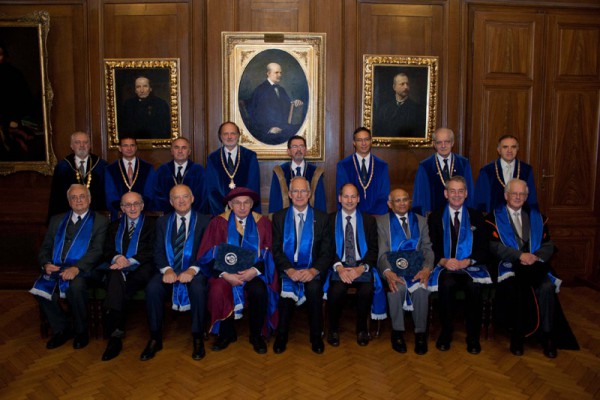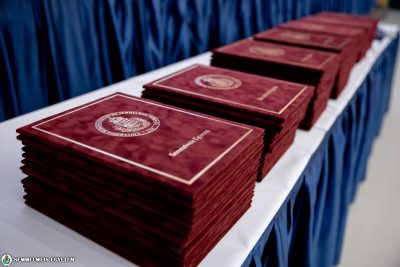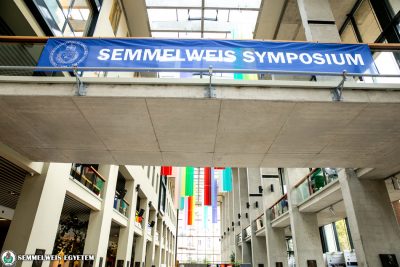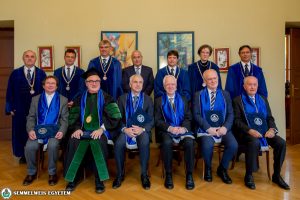Semmelweis University has conferred the title of honorary doctor upon nine professors at a November 16 ceremony held in the Semmelweis Salon. The honorary title, presented for the 38th time this year, recognises individuals who, in addition to making significant contributions to international science in their particular fields of expertise, have fostered a long and fruitful relationship with the University as well.

Dr. Pierre Corvol (Collège de France) is well-known for his contribution to the physiology and pathophysiology of the renin-angiotensin-aldosterone system. His scientific achievements have been recognized by numerous national and international awards. Professor Corvol is a member of the French Academy of Sciences and the American Academy of Arts and Sciences, and was president of the Collège de France between 2007 and 2012. Professor Pierre Corvol has promoted a fruitful collaboration in the research fields of endocrinology between the Collège de France and Semmelweis University, and has offered opportunities for clinical researchers from Semmelweis University to participate in collaborative research programmes.
Dr. George Berci (Cedars-Sinai Medical Centre, UCLA) was born in Hungary, leaving the country after the Revolution of 1956. He has been conducting research in laparoscopic surgery for 50 years. His innovative ability has resulted in a number of devices, such as special cystoscopes, paediatric esophagoscope, and video intubation systems. In 1962, he constructed a miniature television camera through which – first time in the history of medicine – it was possible to see transmission from the abdomen of a living person. Professor Berci is one of the most honoured surgeons in the world; a new department at the Cedars-Sinai Medical Centre bears the name Minimally Invasive Surgery in Honour of Dr. George Berci. Professor George Berci organised and directed the first laparoscopic cholecystectomy in Budapest in 1991. He is a continuous supporter of Hungarian surgeons in both practical courses and the operating rooms.
Dr. Axel Ullrich (Max Planck Institute) is a recognised leader in gene technology. In the 1980s, he developed Humulin (human insulin), the world’s first biotechnology product. Over the course of his highly successful research work, he initiated a new era in the war against cancer. He has founded several thriving companies based on his breakthrough results, including the German-Hungarian company, Vichem. With more than 75, 000 citations to his name, Professor Ullrich is one of the most frequently cited scientists in what has been an extremely progressive era of science.
Dr. Imre G. Csizmadia (University of Toronto) studies the intelligent mechanisms of known pharmaceuticals and natural products, such as aspirin, penicillin, vitamins, and coenzymes, to see how such information might used in modern drug design. He has been teaching at the University of Toronto’s Department of Chemistry since 1964. As part of his educational activities, Professor Csizmadia developed a new teaching method, which helps to develop the creativity of students by integrating research into teaching. As part of his collaborative activities, he organised a Summer School in Hungary for University of Toronto students, with the participation of Semmelweis University, the University of Szeged, and Eötvös Loránd University.
Dr. Árpád Gyéresi’s (University of Medicine and Pharmacy of Târgu Mures) main fields of scientific interest are the stability of drugs, separation techniques (e.g. chromatography and capillary electrophoresis), and the interaction of active principles and excipients. His professional and scientific achievements have earned 13 prestigious awards and prizes. Professor Gyéresi served as head of the Department of Pharmaceutical Chemistry at the University of Medicine and Pharmacy of Târgu Mures. As part of his extremely broad educational work, he initiated the introduction of several new subjects. Through his educational and scientific activities over the past four decades, he has achieved significant progress in improving the ties between Hungarian and Romanian higher education.
Dr. Vinod P. Shah (JSS University of Mysore) worked for the US Food and Drug Administration (FDA) for 30 years, in various positions. He received several FDA awards for his exceptional work, including the FDA Award of Merit and the FDA Distinguished Career Service Award. Professor Shah has held a leadership position in several pharmaceutical societies. He has fostered a close relationship with Semmelweis University’s Department of Pharmaceutics for over ten years, during which time he participated in organising three international regulatory workshops. This past September, Professor Shah was awarded an honorary membership in the Hungarian Society for Experimental and Clinical Pharmacology.
Joseph Kutzin (World Health Organisation) is a leading health economist, and one of the most recognised health financing policy experts of the World Health Organisation. The focus of his scientific work is on, among others, the functional analysis of health care systems. He has been working with the Health Services Management Training Centre of Semmelweis University for more than ten years, in part as a visiting fellow at the Centre’s international teaching courses, including the widely recognised Flagship Programme of the World Bank Institute. His collaboration with Semmelweis University extends also to research and consultancy; he has supported Hungarian health care reforms as an international expert on numerous occasions.
Dr. Jozef Corveleyn (Catholic University of Leuven) focuses the major part of his research on the clinical psychology of religion. His research highlights the healing influences of religion, while also pointing out those situations, in which religion can produce the opposite effect. Through his help, researchers at Semmelweis University were able to conduct studies and establish international relations in a discipline whose mere existence was, for all practical purposes, questioned in pre-1990 Hungary. Through his personal contributions and institutional background, Professor Corveleyn has supported the introduction of several new courses at Semmelweis University and the establishment of international research collaborations.
Dr. Jürgen Michael Steinacker (University of Ulm), chair of the Institute of Sport and Rehabilitation at the University of Ulm, is an internationally recognised sport scientist. He fosters extensive connections with scientific life in Hungary and, for the past decades, has been working together with the Hungarian Rowing Association and the Hungarian Olympic Committee. Over the years, Professor Steinacker has carried out numerous joint projects with Semmelweis University in the fields of spiroergometry and high resolution molecular analysis. As part of this ongoing collaboration, Professor Steinacker has offered research possibilities for Semmelweis University students, and supported his research group’s involvement in the Faculty of Physical Education and Sport Sciences’ Ph.D. programme.
Gina Varga-Gönczi


